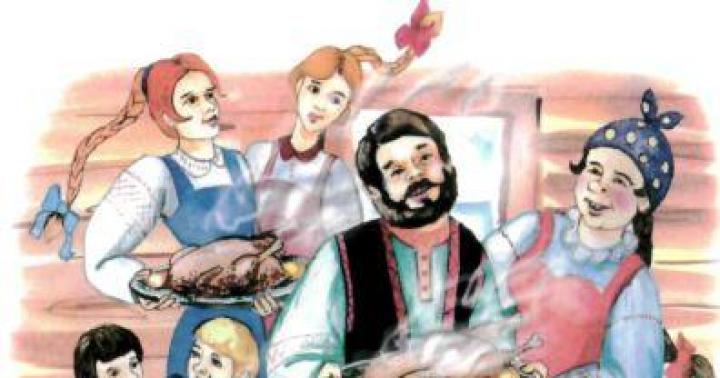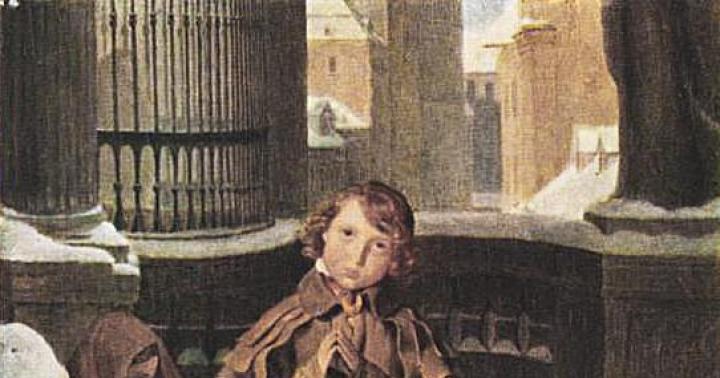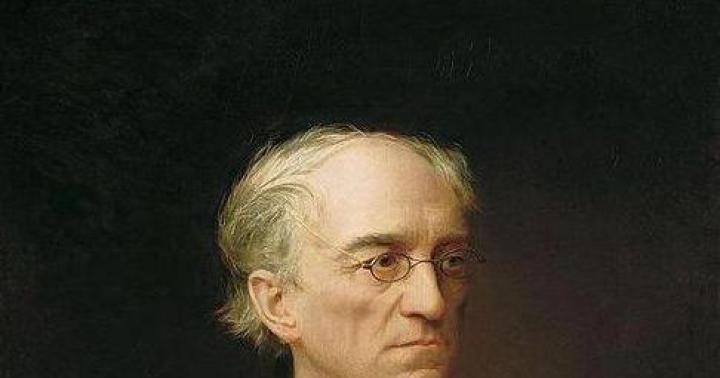The protagonist of Tolstoy's fairy tale "How a peasant divided the geese" is a poor peasant. The peasant was so poor that one day he had no bread. He decided to ask the master for bread, and in order not to go empty-handed, he caught a goose and roasted it.
The master liked the gift, but he decided to give the peasant the task of how to divide that goose among the members of the lord's family. The peasant thought, and suggested a solution that both the master liked, and the peasant did not remain in the loser. The contented gentleman gave the peasant bread, and even added money.
The rich man learned the story of the goose. He also came to the master and brought him a few geese as a gift. The master asked him a question, how to divide the geese? But the rich man could not master this task. Then they called the poor peasant to the master. He again divided the geese in a cunning way - one goose to the master and the lady, the other to the two sons of the master, the third to the two daughters of the master. And the peasant took two geese for himself, explaining that now all three came out.
Again the master liked how the poor peasant knows how to share. The master rewarded him with money and bread, and kicked out the rich peasant.
This is the summary of the story.
The main idea of Tolstoy's fairy tale "How a man divided geese" is that a smart and savvy person will always find an opportunity to solve a problem for his own benefit. The poor peasant went to the master to ask for bread, and as a result, he not only got hold of bread, but also money and geese. And he managed to win the respect of the master.
Tolstoy's tale teaches not to get lost in difficult situations, to show quick wit and ingenuity.
In the fairy tale "How a man divided geese" I liked the main character, a poor man. Going to the master to ask for bread, he prepared a gift in the form of a roast goose. And when the master asked him a cunning problem, the peasant managed to solve it in such a way that he himself remained with profit.
What proverbs are suitable for the fairy tale "How a man divided geese"?
Need for inventions is cunning.
The stupid one turns sour, but the smart one will provide for everything.
Need dares deed.
The resourceful will not be puzzled.
Nevertheless, it is pleasant to read the fairy tale "How a man divided the geese" by L. Tolstoy, even for adults, childhood is immediately remembered, and again, like a little one, you empathize with the heroes and rejoice with them. Charm, admiration and indescribable inner joy are produced by pictures drawn by our imagination when reading such works. Despite the fact that all fairy tales are fantasy, however, they often retain the logic and sequence of events. "Good always conquers evil" - this foundation is built on, like this one, and this creation, from an early age laying the foundation of our worldview. With the virtuosity of a genius, portraits of heroes are depicted, their appearance, rich inner world, they "breathe life" into creation and the events taking place in it. All descriptions of the environment are created and presented with a feeling of deepest love and appreciation for the object of presentation and creation. Dozens, hundreds of years separate us from the time of creation of the work, but the problems and customs of people remain the same, practically unchanged. The tale "How a man divided the geese" by Tolstoy L.N. is worth reading for everyone online, here is deep wisdom, philosophy, and simplicity of the plot with a good ending.
One poor peasant ran out of bread. So he decided to ask the master for bread. In order to have something to go to the master, he caught a goose, roasted it and carried it. The master accepted the goose and said to the peasant:
- Thank you, man, you have a goose, but I don’t know how we will divide your goose. I have a wife, two sons and two daughters. How can we share a goose without resentment?
The man says:
- I'll share. - He took a knife, cut off his head and said to the master: - You are the head of the whole house, your head. - Then he cut off the back, gives it to the mistress: - You, he says, sit at home, look after the house, you back. - Then he cut off the paws and gives it to his sons: - You, he says, legs - to trample on father's paths. - And he gave wings to his daughters: - You, he says, will soon fly away from home, here's a wing for you. I'll take the rest! And he took the whole goose.
The master laughed and gave the peasant bread and money. A rich peasant heard that the master rewarded the poor peasant with bread and money for a goose, roasted five geese and carried them to the master. Barin says:
Thanks for the geese. Yes, I have a wife, two sons, two daughters, all six, how would we equally divide your geese?
The rich man began to think and came up with nothing.
The master sent for the poor peasant and ordered to share. The poor peasant took one goose - gave it to the master and the lady and said:
“Here are the three of you with the goose. - He gave one to his sons: - And you, he says, are three. - He gave one to his daughters: - And there are three of you. - And he took two geese for himself: - Here, he says, there are three of us with geese - all equally.
The master laughed and gave the poor peasant more money and bread, and drove the rich one away.
| « |
How a man divided geese
One poor peasant ran out of bread. So he decided to ask the master for bread. In order to have something to go to the master, he caught a goose, roasted it and carried it.
The master accepted the goose and said to the peasant: “Thank you, peasant, for the goose; I just don’t know how we are going to share your goose. I have a wife, two sons and two daughters. How can we share a goose without resentment?”
The man says: "I will share." He took a knife, cut off his head and said to the master: "You are the head of the whole house - your head."
Then he cut off the back, gives it to the mistress. “You,” he says, “sit at home, look after the house - you’re back.”
Then he cut off the paws and gives it to his sons. "You, - he says, - legs - trample the paths."
And gave wings to his daughters. “You,” he says, “will soon fly away from home, here's a wing for you. I'll take the rest!"
And took the whole goose. The master laughed and gave the peasant bread and money. A rich peasant found out that the master rewarded the peasant with bread and money for a goose, roasted five geese and carried them to the master.
The barin says: “Thank you for the geese.  Just see, I have a wife, two sons, two daughters - all six. How can we share your geese?”
Just see, I have a wife, two sons, two daughters - all six. How can we share your geese?”
The rich man began to think and came up with nothing. The master sent for the poor peasant and ordered to share.
The peasant took one goose, gave it to the master and the lady, and said: "Here are three of you with a goose."
He gave one to his sons: “And you,” he says, “three.”
He gave one to his daughters: "And there are three of you."
And he took two geese for himself: “Here,” he says, “and there are three of us with geese, all equally!”
The master laughed and gave the poor peasant more money and bread, and drove the rich one away.
Fairy tale in retelling
About the fairy tale
Russian folk tale "How a man divided geese"
In Russia, it is customary to dislike those who live better. Especially if this is a boss, a wealthy neighbor, or, as in this children's fairy tale, a gentleman. But there are exceptions to every rule. It happens that the owner of the estate, and sometimes the serfs, is not a cruel and nasty fool, but a pleasant, quick-witted person, not devoid of a sense of humor.
In this children's story, just such is described. He has a large and friendly family, and he is fair. The man, here, as in most Russian folk books, is smart and resourceful. But another main character, also Barin, is not so positive, he is fisted, he believes that there is never much money and constantly wants to improve his well-being, but not at the expense of his original ideas, but at the expense of the peasant's idea.
Summary of the text
Hungry times came in one village, but the wise Man did not want to put up with the sad reality. He decided to ask for some livelihood from the master. But, in order not to go to him empty-handed, he considered it necessary to take a small kickback with him - a roast goose.
The master thanked him for such a gift and complained that there was only one bird, and his family was large. But the Peasant did not lose his head and began to divide the offering. He singled out the head of the clan for the head of the clan, he is also the “head”, his wife - the “back”, she always follows her husband, their sons - legs, they “tread the paths” of their father’s estate, wings for daughters, because they will fly away from the home nest. He granted himself the remnants, i.e. the rest of the goose. The owner was not angry because of such a division, on the contrary, he appreciated the ingenuity of the peasant and, in addition to meat, also rewarded him with money.
Barin's greedy neighbor found out about this. He also wanted easy money, and, of course, he needed a much larger amount than the Muzhik received. The insidious tradesman fried as many as five goose carcasses and recovered to bow. He was also asked to share the gifts. But he couldn't figure out how to do it right. I had to call a more knowledgeable person in this matter - the Muzhik. He suggested dividing the goose in such a way that everyone got as many as three geese, out of five possible. A trio came out of the Sons, Daughters and Parents together with the goose, and the resourceful worker got two full-fledged birds, and even a reward from the Master.
After reading this instructive children's tale, a number of simple conclusions can be drawn:
- A quick-witted and purposeful hard worker will never be left with nothing, because. will always earn a living thanks to almost innate ingenuity;
— Greed is still a vice, regardless of social status;
- Rich does not always mean a stingy and sharply negative personality, sometimes it is a fair and far-sighted character;
“There are moments when you can create an impressive fortune out of nothing;
- Poverty is not an indicator of a person's education or character;
- If you act fairly, it will be good not only for a single person, but also for those around you.
In general, “How a man divided geese” is a fairy tale that in any society there are good people and not very good people, and the social niche that a person occupies does not always determine the scale of a person and their moral values.
Read the Russian folk tale "How a man divided the geese" online for free and without registration.
One poor peasant ran out of bread. So he decided to ask the master for bread. In order to have something to go to the master, he caught a goose, roasted it and carried it. The master accepted the goose and said to the peasant:
Thank you, man, you for the goose; I just don’t know how we are going to share your goose. I have a wife, two sons and two daughters. How can we share a goose without resentment?
The man says:
I will share.
He took a knife, cut off his head and said to the master:
You are the head of the whole house - your head.
Then he cut off the back, gives it to the mistress.
You, - he says, - to sit at home, look after the house - you back.
Then he cut off the paws and gives it to his sons.
You, - he says, - legs - to stomp on his father's paths.
And gave wings to his daughters.
You, - he says, - will soon fly away from home, here's a wing for you. I'll take the rest!
And took the whole goose.
The master laughed and gave the peasant bread and money.
A rich peasant heard that the master rewarded the poor peasant with bread and money for a goose, roasted five geese and carried them to the master.
Barin says:
Thanks for the goose. Yes, I have a wife, two sons, two daughters - all six. How can we evenly divide your geese?
The rich man began to think and came up with nothing.
The master sent for the poor peasant and ordered to share.
The poor peasant took one goose and gave it to the master and the lady, and said:
Here are the three of you with the goose.
He gave one to his sons:
And you, - says, - three.
He gave one to his daughters:
And there are three of you.
And he took two geese for himself:
Here, - he says, - and there are three of us with geese, all equally.
The master laughed and gave the poor peasant more money and bread, and drove the rich one away.


